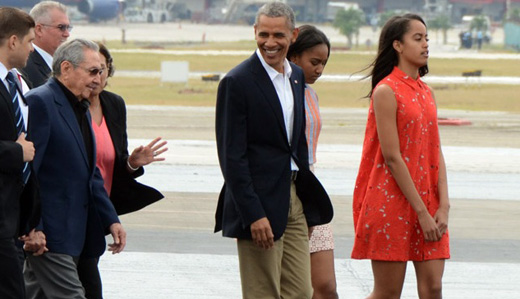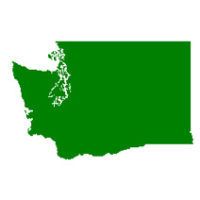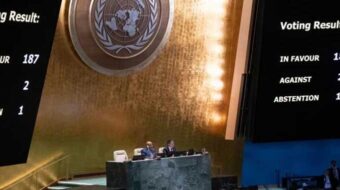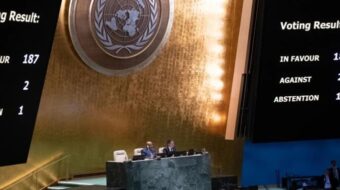
For those who have been involved in the Cuba solidarity movement for years, the meeting between Presidents Barack Obama and Raul Castro this past week undoubtedly stands as a milestone. It’s a powerful symbol of the move toward normalization between the two countries.
But with all the pageantry of the trip – from the awkward press conferences to the baseball diplomacy – it might be easy to forget that a lot of the hard and detailed work to end the blockade goes on behind the scenes and in the halls of power back in Washington. And for all the importance of Obama’s visit – and don’t get me wrong, it’s huge – there is still a lot of work to be done.
Since Obama announced the shift in U.S. policy toward Cuba back on December 17, 2014, meetings between the two sides have progressively grown in importance as discussions take on a life of their own. A case in point: immediately after the President announced in February that he would be headed to Havana, a “Cuba Consortium Conference” was convened in D.C.
Senior officials of the Obama administration, academics, and business people conducted a nine-hour session on “the complex framework of laws” which make up the U.S. blockade.
Commerce Secretary Penny Pritzker recalled her trip to Havana last October, stating openly: “We learned that in Cuba – as in many of our other trading partners around the world – it is necessary to work with state-owned enterprises in order to support the local private sector.” Such a recognition is a good start, but not yet far enough.
In his remarks, Rodrigo Malmierca, the Cuban Minister of Foreign Trade and Investment, highlighted three key aspects of the blockade policy which Obama himself still has the power to change: permitting the island to use the dollar in international financial transactions, authorizing Cuban exports to the U.S., and allowing American companies to invest in other sectors besides telecommunications.
Understanding the meaning of democracy includes the ability to think critically, to use dialectics to expose the contradiction and folly of U.S. policy toward Cuba. Treasury Department specialist Andrea Gacki, perhaps inadvertently, did just that at the conference. Responding to a question from a Granma International reporter, Gacki was at a total loss when asked to specifically identify the law which prohibits Cuba’s use of the dollar in international transactions. Her response: the issue is being investigated.
In this instance, the ability of people to travel and trade between Cuba and the U.S. is a constitutional protection that has been prohibited by the Helms-Burton Act in contravention of international standards regarding the right of a people to their own self-determination. Cuban and U.S. citizens both are harmed due to illegal, criminal legislation in violation of the sovereignty of independent states.
Why continue supporting a policy overwhelmingly rejected by the U.S. population while the rest of the world watches in amazement?
Obama’s visit to Cuba to advance the process of normalization is a recognition of the fact that the world has changed. But that doesn’t mean there aren’t still potential hurdles along the way as this process moves forward.
For instance, the Deputy National Security advisor, Ben Rhodes, was still emphasizing to the press just last month that he thinks “we’re always going to have differences with this government [Cuba] because they have a different political system.” It is clear that the momentum needed to end the blockade – the main obstacle to Cuba’s development and the normalization of relations – can’t come too soon.
There are signs that the wind may be at the backs of the anti-blockade forces. Attitudes among Cuban Americans are shifting in favor of ending the blockade. The U.S. government must recognize these voices – along with the demands of the farm and agriculture community to trade with their Cuban counterparts.
Congress has a duty to represent the good of all. With rapprochement moving forward, what are we waiting for?












Comments